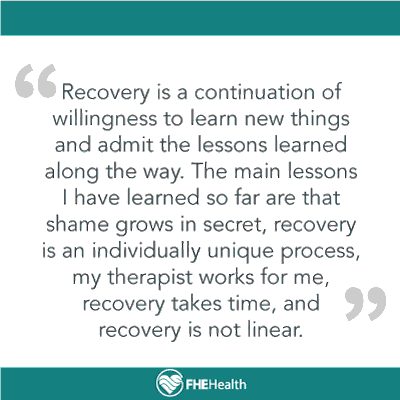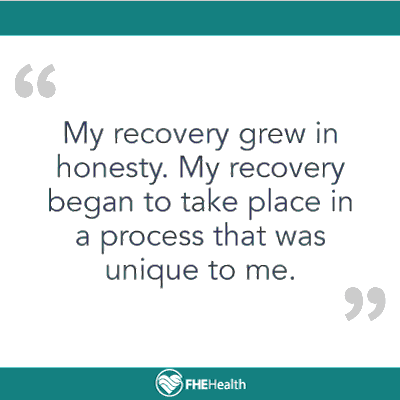
 When describing my recovery journey, I do not say that I am recovered. This suggests that recovery ends. I think it is quite the opposite. Recovery and wellness, for me, is an ongoing journey. Recovery is a continuation of willingness to learn new things and admit the lessons learned along the way. The main lessons I have learned so far are that shame grows in secret, recovery is an individually unique process, my therapist works for me, recovery takes time, and recovery is not linear.
When describing my recovery journey, I do not say that I am recovered. This suggests that recovery ends. I think it is quite the opposite. Recovery and wellness, for me, is an ongoing journey. Recovery is a continuation of willingness to learn new things and admit the lessons learned along the way. The main lessons I have learned so far are that shame grows in secret, recovery is an individually unique process, my therapist works for me, recovery takes time, and recovery is not linear.
Shame grows in secret
Oh shame. That heavy blanket of secrecy. The blanket that keeps my secrets safe with me and only me. The one that whispers, “If they know, they will leave you.” The one that says, “I protect you.” The one that says, “It’s somehow your fault so you can’t tell.” The one that feels safe at first but eventually becomes a suffocating liar. I know it’s a liar because it went from feeling safe to telling me that I needed to give up. Shame wanted to keep me trapped.
I remember when I first began my recovery journey. It actually began before coming to FHE. My therapist had me create a timeline. I did a cool magazine collage one to satisfy the artist in me. Anyway, I started it at age 17. When my therapist asked why I said, “I’ve already talked about my childhood events.” Turns out, that was not a truthful statement. I hadn’t told a single person about things I experienced. I felt so much shame about it and truly believed it was my fault. So, I kept it a secret. My shame grew and grew in my secrets. My shame continued to lie to me.
 It wasn’t until I was sitting near the pool, under the beautiful palm trees at FHE, half a country away from home, that I felt safe enough to share my secrets. At that point, I couldn’t even verbalize it. So, I wrote it down in my notebook. That first step was the action I needed to step out of the suffocation of shame. That step out of the darkness, into the light, caused one layer of shame to fall off. As a result, it became easier and easier to write about my experiences.
It wasn’t until I was sitting near the pool, under the beautiful palm trees at FHE, half a country away from home, that I felt safe enough to share my secrets. At that point, I couldn’t even verbalize it. So, I wrote it down in my notebook. That first step was the action I needed to step out of the suffocation of shame. That step out of the darkness, into the light, caused one layer of shame to fall off. As a result, it became easier and easier to write about my experiences.
The more I wrote, the more shame decreased. With the decrease in shame, I could see the truth. I could see it wasn’t my fault. I could see that I was worth the work of recovery. My shame grew in my secrets. My recovery grew in honesty. My recovery began to take place in a process that was unique to me.
Recovery is an individually unique process
Read that heading again. Recovery is not an individual process. It requires a team. However, the steps to that recovery are unique to the individual discovering it. Some things do have a protocol for how they are done. This protocol ensures that the recovering individual is safe in doing it. However, what works for one may not work for another. There’s a reason why different forms of therapy and a variety of coping skills exist.
Each individual is unique. Their trauma and how they experience it is unique to them. Therefore, their recovery process and timeline will be unique to them. It’s like those group painting classes. There is the painting the teacher did as an example. Yet each painting will be different, even if slightly, from the original. Simply holding the brush differently can change the outcome. And that’s ok.
That’s one of the many wonderful things I learned at FHE. Some of us thrived in group therapy, some found the most in individual therapy, while others found DBT to be the best one for them. For me, my experience with journaling and breathwork were the most profound tools. Breathwork changed my life. Others didn’t have the same experience as I did. And that is perfectly ok because we are all unique individuals. That is why FHE has so many different opportunities for healing available.
My therapist works for me
It is very important to continue recovery efforts after returning home. Outpatient therapy is one of the tools I have continued to use. I am very lucky and blessed that I had found a solid therapist before going to FHE. I believe that she is great for me because of my mindset that “she works for me.”
When I chose my new therapist, I found a handful that specialized in DBT. It’s a practice I knew would be helpful. I then wrote down four questions that I felt were important to knowing about the mindset a therapist chooses when practicing. My most important question was “Do you think that people can recover from mental illness?” I literally interviewed them like I was hiring a new employee.
When a manager is looking for new employees, they don’t hire anyone without making sure they are a good fit for the team. The manager asks questions, reads the vibes, then thinks about who would be the best to help the team succeed. They don’t want to waste time and money on someone who won’t fit the team dynamics. The same goes for the Client/Therapist relationship.
My therapist is paid to help me navigate life stuff. If I’m going to be paying someone, I want them to work well with me. This also means that you can fire a therapist and find a new one. We are all growing and changing people. Sometimes, that means that the relationship of Client/Therapist may no longer be optimal. That’s ok.
Recovery takes time
I know. Nobody wants to hear that. I certainly didn’t want to hear it. I wanted to just wave a magic wand and be cured. I have learned that I am not good at finding magic wands because my recovery has taken time. However, if you had asked me two years ago if I would be in the healthy place I am, I would have laughed. I didn’t think it was possible but somehow, I held onto hope. I grabbed every tool and have applied it to my journey.
It has taken time. It has taken lessons. It has taken effort. Just like a house isn’t built overnight, recovery takes time and practice too. It has not been a linear journey. It has not been a sprint; it has been a marathon.
Recovery is not linear
There’s a popular meme that describes how one thinks their plans will go and it is a straight line. Below it is an image of how things really go. It shows ups, downs, twists, turns, and a longer journey than anticipated. Oh, how I relate to this with recovery!
When I first went to FHE, I stated my goal was to learn how to navigate my mental health. I’m so grateful that I stated it just like that. I have faced some pretty heavy things since I left FHE. I’m not going to sit here and say that I perfectly navigated life afterward either. I’ve had moments I did not think I could continue. I’ve had times where I fell flat on my face, laid there, and cried, then had to make a decision to get up and keep going or stay there and miss potential happiness. Every time, I have chosen to get back up, use my tools, learn new skills, and only slightly roll my eyes when my therapist says, “Recovery is not linear.”
When recovery gets tough, please be gracious to yourself. Remind yourself that you are learning a new way of behaving, a new way of thinking, and a new way of thriving. Remind yourself that you are worth all the work you are putting into recovery. I promise you are worth it.
FHE Health
At FHE Health, our dedicated team of counselors can help you with your journey to recovery. Call FHE Health today at (833) 591-1536 to speak to a professional.






